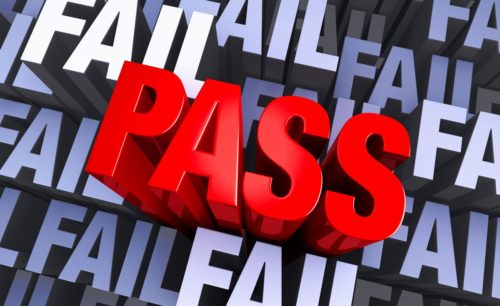
29 Mar Should We Consider Pass/Fail Grading?
Thomas R. Guskey, Senior Research Scholar, University of Louisville
Originally published in Ed Week March 8, 2020
With schools around the world moving to online instruction in the wake of the coronavirus pandemic, questions have been raised about adopting pass/fail grading. Advocates contend this would be fairer to students and teachers who must deal with unprecedented changes in both teaching and learning. They also suggest pass/fail grading would help students focus on learning to improve their understanding rather than performing primarily to achieve high grades. Opponents argue, however, that the change would diminish academic rigor and lessen students’ motivation to strive for excellence.
Research on pass/fail grading abounds. A Google search on “Scholarly articles on pass/fail grading” yields over 16 million hits. An ERIC search offers 335 articles and research studies. Quickly reviewing this research reveals the following:
1. Nearly all studies on pass/fail grading have been conducted at the college and university level, primarily in professional schools such as medicine, dentistry, and law.
2. Students who opt to take courses pass/fail generally do whatever is required to pass, but not much more.
3. If students take some courses that use traditional grading and others that use pass/fail grading, they generally put more effort into those that use traditional grades.
4. The key to successful pass/fail grading rests in establishing clear criteria for “pass” and making those criteria challenging, rigorous, and attainable. Excellent examples include certification examinations in medicine, nursing, law, military or civil service.
But in light of this evidence, we must also consider the extraordinary nature of our current situation. The ancient Greek physician Hippocrates is credited with the quote, “Desperate times require desperate measures.” What he meant is that in adverse circumstances, actions that might have been rejected under other circumstances may become the best choice. And these are certainly desperate times.
Considering our circumstances, Harvard University, the Massachusetts Institute of Technology, Boston College, Boston University, Northeastern University, and Smith College all recently decided to temporarily shift to pass/fail grading after switching to remote learning this semester. Harvard officials refer to the grades as “emergency satisfactory” and “emergency unsatisfactory.” Numerous other universities are doing the same to adapt to the coronavirus pandemic.
Jonathan Zimmerman, who teaches education and history at the University of Pennsylvania, recently wrote an excellent essay about this change that can be retrieved at: https://www.insidehighered.com/views/2020/03/26/reviewing-history-pass-fail-reminds-us-how-we-should-consider-option-today-opinion
Pass/fail grades may prove to be a viable option for K-12 educators as well. By making student learning our primary focus; helping students take that same focus; ensuring the criteria we establish for passing are clear, rigorous, and attainable; and then doing everything within our power to help ALL students meet those criteria; we may make the best of these difficult and trying times.




Sorry, the comment form is closed at this time.